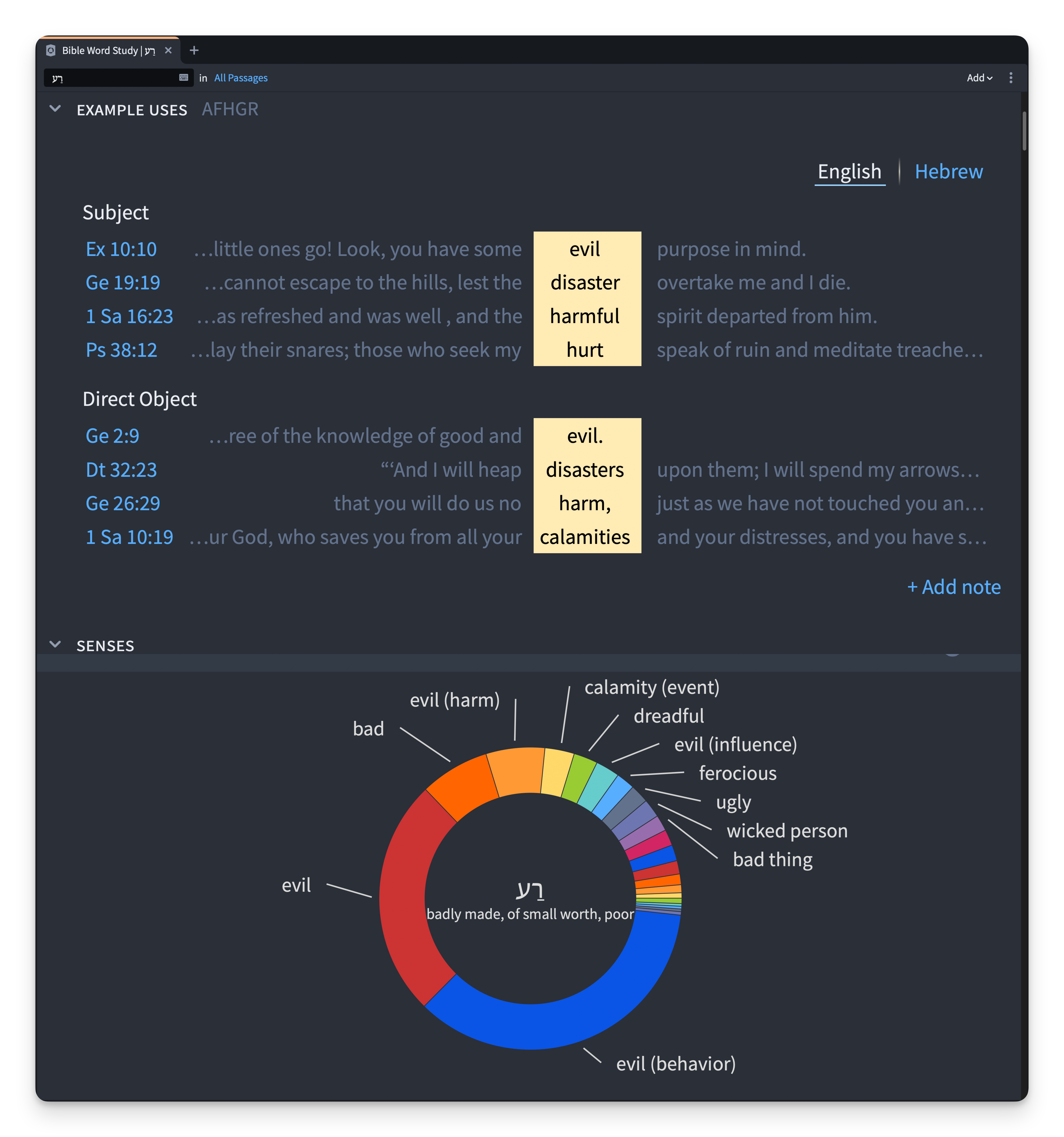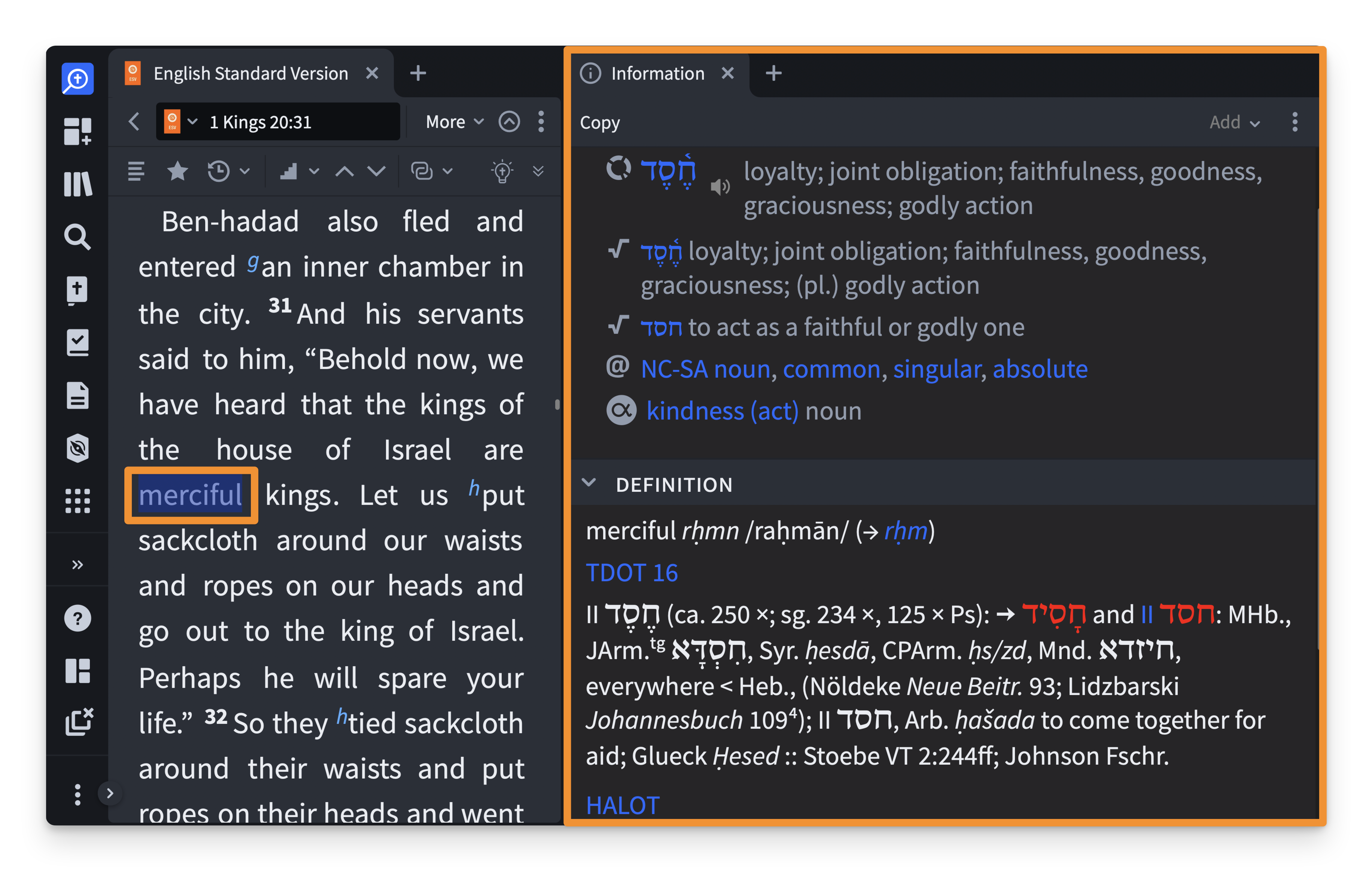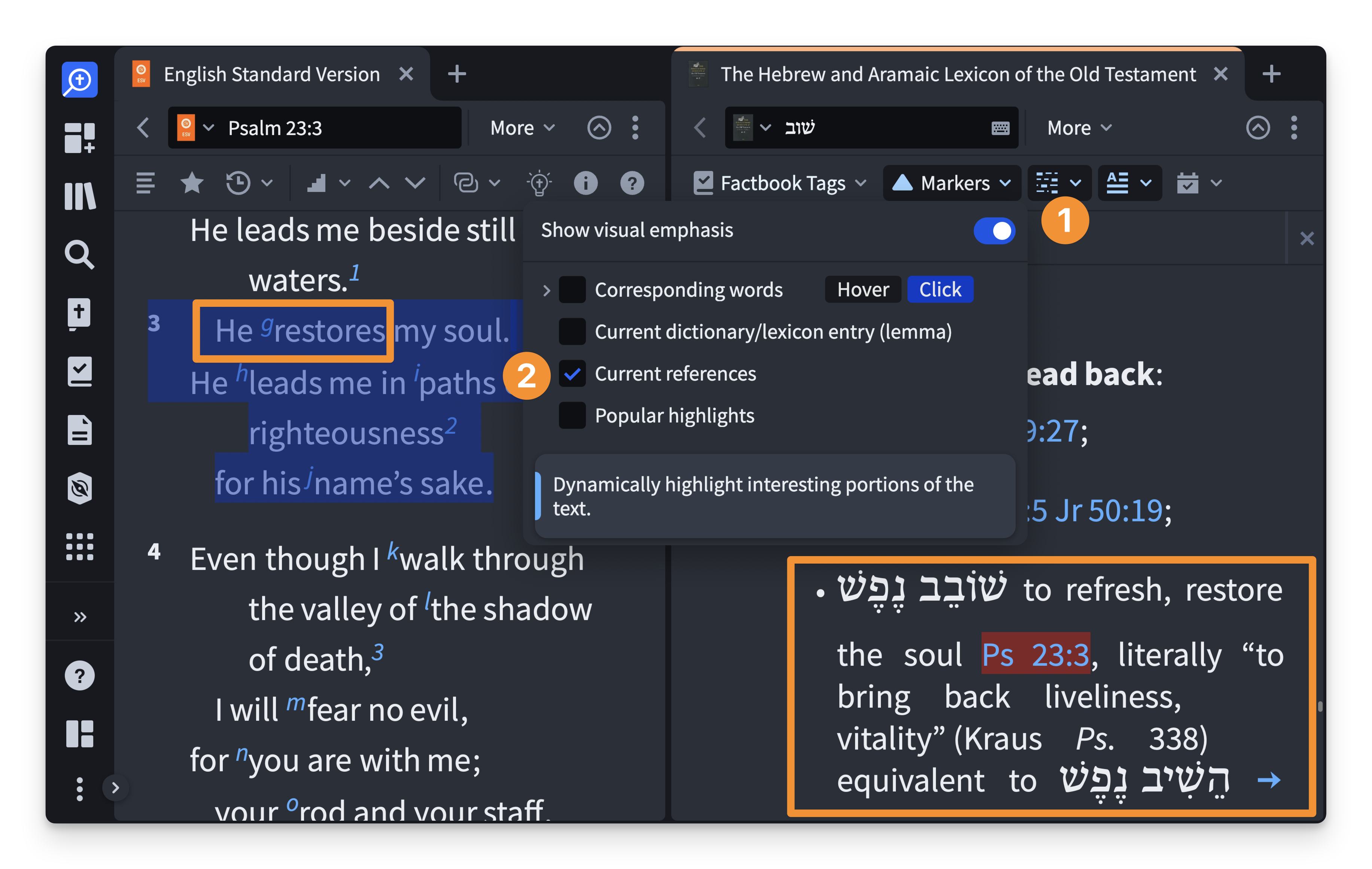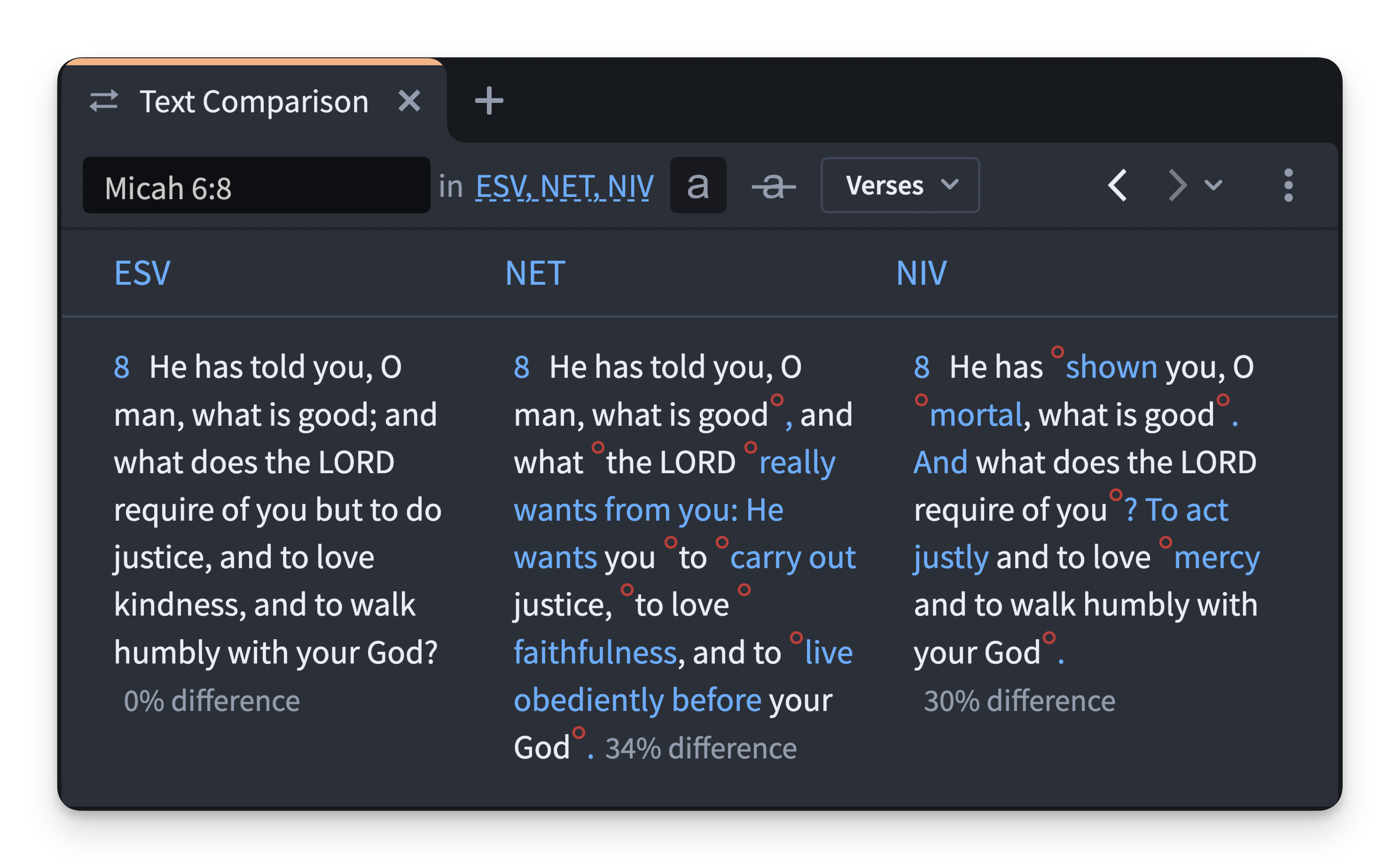As a baby, I liked the Select Your Personal Journey e book collection. These books allowed me to form the story to my needs. No different e book allowed that. If I didn’t like an end result, I merely “rewound” my determination and selected one other. The e book supplied the choices; I made up my mind the result. I worry we regularly wield our Hebrew and Greek lexicons as if they have been just like the Select Your Personal Journey collection: We open the lexicon to a phrase’s entry, select from among the many choices on that web page, and insert our alternative into our translation and interpretation. However after we select based mostly on our needs and never the foundations of the language, we make lexical errors and will find yourself with an inaccurate studying.
With entry to sources comes obligations—obligations grounded in how languages work. Omitting these can result in teachings that sound good and get handed down from one particular person to a different, however don’t observe the foundations of translation.
Lexical errors
Responsibly wielding lexical sources requires understanding how languages work. For lexical points, this implies understanding the distinction between glosses and definitions, in addition to understanding the restrictions of lexicons and glosses.
1. Glosses should not definitions
Usually when studying Hebrew and Greek you study glosses—not definitions. A “gloss” is a flowery approach of claiming, That is an English phrase that may generally be utilized in a translation once you see this Hebrew or Greek phrase. For instance, if you happen to see the Hebrew phrase רַע (ra’) and assume “evil,” you’ve simply considered a gloss—not a definition. “Evil” isn’t the definition of רַע, however it’s a gloss for it.
Lexicons are repositories for these glosses. Generally lexicons present extra explanations with the glosses, however not all the time.
In languages, phrases in isolation talk a common broad idea (a semantic vary); some phrases have multiple.
However when that phrase is positioned in a context—voila!—that broad idea abruptly has been narrowed down by the context into a selected that means that may be translated with a gloss.


Use Logos’s Bible Word Study to discover the completely different senses of רַע (ra’).
Returning to our instance, the semantic vary of רַע is solely “disagreeable” or “unhealthy.” When utilized in some contexts, the “disagreeable” factor is an ethical habits that English would name “evil.” Thus a contextual gloss for רַע could be “evil.” However in different contexts, רַע describes non-evil issues reminiscent of “troubling” information (Exod 33:4), “unhealthy” cows (Gen 41:20), and a “sullen” countenance (Gen 40:7). Defining רַע as “evil” may even create an pointless theological dilemma in verses the place God does רַע (Isa 45:7). God doesn’t do evil, however he does decide and self-discipline, which is disagreeable for the individuals.
In different phrases, context should decide the suitable gloss.
2. Glosses should not interchangeable
Since glosses have to be chosen based mostly on context, glosses should not interchangeable.
Say I’m studying 1 Kings 20:31 the place Ben-Hadad is trapped by Ahab. His advisors advocate sporting sackcloth and begging for mercy as a result of that they had heard the Israelite kings have been “kings of mercy” (20:31). Maybe I’m confused about this phrase as a result of the Northern Kingdom was not precisely an awesome kingdom, so why would the kings be referred to as merciful? I lookup the Hebrew phrase in an effort to seek out a solution to my query.


Simply pull up lexical data straight out of your Bible utilizing Logos’s highly effective Information tool.
The phrase “mercy” is the notorious חֶסֶד (ḥesed), which I lookup in Enhanced Brown-Driver-Briggs Hebrew and English Lexicon (BDB). As I skim the entry, my eyes fall upon entry I.4 that lists “beautiful look.”
My verse isn’t listed in that entry, however I additionally know that lexicons don’t all the time point out each occasion of a phrase. So, I theorize that possibly what is definitely taking place right here is that the advisors are noting that the Israelite kings have been identified for being beautiful in look. So in the event that they put on sackcloth to visually decrease themselves in distinction to the “beautiful” look of Ahab, Ahab won’t really feel threatened by them, and thus enable them to stay. This interpretation depends on a gloss within the lexicon and it resolves my confusion with the Israelite kings being referred to as merciful.
I hope this instance sounds ludicrous. The lesson right here is that glosses should not interchangeable. On this instance, I discovered a gloss I may use to unravel my dilemma, however in doing so I selected a gloss that match my want, not the context. There’s nothing in Ahab’s tales to counsel he was “beautiful in look,” or that any of the kings have been. Additional, I failed to note that the “beautiful look” entry specifies flowers, not people. I failed to note that the lexicon truly classifies my verse beneath the “kindness” to “lowly, needy, and depressing” individuals. This suits the context, the place Ben-Hadad, by way of sackcloth, is representing himself as lowly, and thus in want of kindness.
The extra be aware that BDB supplies with the contextual gloss for my verse clarifies the kind of kindness, nevertheless it doesn’t remedy my dilemma concerning the fame of the Israelite kings. I can’t remedy that dilemma by selecting a distinct gloss.
A key a part of avoiding lexical errors requires understanding the limitations of a lexicon’s usefulness.
3. Lexicons don’t reply all questions
Because the earlier instance reveals, a query that leads me to a lexicon can not all the time be answered by the lexicon. I need to ask my query elsewhere. Wielding a lexicon won’t all the time reply the questions you need answered.
However generally it does.
Maybe I’m learning Psalm 23:3, and I’m struck by the assertion that God “restores my soul” (NASB). There are a number of doable methods I may perceive that theologically. So I lookup the Hebrew verb (שׁוב) in The Hebrew and Aramaic Lexicon of the Old Testament (HALOT), cautious to look beneath the part on the corresponding verbal stem. And I see Psalm 23:3 listed with the precise gloss of “to refresh, restore the soul,” which is a subcategory beneath the broader contextual class “carry again, lead again.”


In Logos, you’ll be able to customise your lexicon’s formatting settings so you will discover what you want in a breeze.
With this data and the context of the psalm, I’m able to deepen my understanding of the psalmist’s declaration. God brings again or restores the psalmist’s life. Studying this affirms the interpretation of “restore” whereas additionally serving to me ponder additional the exact sort of restoration.
Lexicons may also help hone our understanding of why sure English translations have been chosen. This may be particularly useful when an English gloss can not totally talk what the Hebrew phrase does.
4. Glosses are restricted by English
When English has no excellent phrase or phrase for glossing a Hebrew phrase, the lexicons nonetheless give us English glosses—glosses which might be as shut as we will get in our language.
Let’s take the notorious חֶסֶד (ḥesed) once more. In Micah 6:8, חֶסֶד describes what God requires of his individuals: “to do justice and to like חֶסֶד and to stroll humbly along with your God.” Many translations use “to like kindness” right here (e.g., NASB, ESV, NRSV). “Kindness” comes near the Hebrew that means, however “kindness” is an outline of an individual’s disposition. חֶסֶד is that, however can be extra than that.
BDB’s class for this verse supplies the gloss “kindness,” but additionally supplies an extra be aware saying that it’s “kindness (particularly as prolonged to the lowly, needy and depressing), mercy.” This extra be aware helps a bit, however a more recent useful resource can present higher data.
The newer HALOT glosses חֶסֶד between individuals as “joint obligation” and additional notes that it happens “between family members, pals, hosts, and visitor, grasp, and servant; closeness, solidarity, loyalty.” And it additionally permits for a gloss of “faithfulness” in these contexts.
This data modifications how we perceive the “kindness” of Micah 6:8. חֶסֶד is greater than a disposition; it additionally consists of the concepts of obligation and faithfulness. Learn in context, God is looking them again to faithfulness to the covenant the place he teaches them what justice is, their obligations to one another, and stroll humbly with God.
Utilizing lexicons in a fashion that observes the rule of language means understanding that translation requires tough decisions, much more so when there isn’t a excellent gloss. However there are good glosses. That is one other key to avoiding lexical errors.


Use Logos’s Text Comparison tool to simply examine texts, like completely different Bible translations.
Evaluating translations may also help floor these points. Whereas most translations use “kindness” on this verse, the NET makes use of “be trustworthy.” Each glosses collectively present a clearer image of the underlying phrase’s that means.
Consulting a lexicon can make clear the difficulty additional.
Lexical sources
Responsibly wielding lexical sources additionally requires selecting them deliberately and thoughtfully, in addition to investing in studying use them effectively.
1. Selecting sources
Wielding lexical sources responsibly begins once you select your lexicon. When doing so, think about the age, writer, and the creator.
Age
Whereas the biblical languages don’t change, our understanding of them is continually rising due to new linguistic analysis.
As a common rule, I like to recommend the typical consumer of biblical lexicons ought to solely use these printed after 1990. The usual Hebrew tutorial lexicon is HALOT, although the Dictionary of Classical Hebrew could be the usual if it weren’t for the value.
Older sources, reminiscent of BDB, are simply accessible as a result of they’re within the public area; however public area language sources are outdated. Within the century since BDB’s publication, we’ve realized that some data in BDB isn’t correct. Wielding older sources requires the next stage of duty that many customers haven’t been geared up for. It’s higher to wield English sources effectively than to wield Greek or Hebrew sources poorly.
Writer
Not all sources are dependable sources. A technique to make sure your useful resource is dependable is to think about the writer. Respected tutorial publishers will solely publish language sources from well-trained students. This consists of publishers reminiscent of Lexham, Zondervan Tutorial, Baker Tutorial, InterVarsity Press Tutorial, Kregel, Eerdmans, and Brill. If a useful resource isn’t printed by such a writer, you’ll want to rigorously analysis the creator(s).
Creator
Not all authors are geared up to deal with Hebrew and Greek effectively. There are lots of trustworthy lecturers who work together with the languages. But when they aren’t well-trained within the languages or don’t cite latest dependable sources, I might advocate holding their statements concerning the language loosely till you’ll be able to cross-check what they mentioned with a dependable useful resource. An individual well-trained within the languages will sometimes have a related doctorate and they’ll work together pretty with latest analysis and sources within the area.
2. Utilizing sources
Wielding the sources and obligations effectively would possibly require strengthening your language expertise. For an summary on how the biblical languages work I like to recommend Lexham’s Linguistics & Biblical Exegesis. And if you would like additional clarification, Zondervan’s Advances in the Study of Biblical Hebrew and Aramaic and Advances in the Study of Greek present a extra in-depth introduction to options of the languages, together with chapters on lexical points and sources.
Wielding sources effectively additionally requires coaching in utilizing these sources. For those who use a Bible program reminiscent of Logos, put money into rising your expertise with the software program. Put aside time to read tutorials, watch training videos, and discover and take a look at your expertise. Be taught to wield the software program effectively whereas additionally evaluating which sources inside it are ones you might be geared up to make use of responsibly.
For some, wielding the languages effectively could require taking or auditing a category. It could contain deliberately setting apart money and time to put money into one of many many coaching packages crafted by students who exist exterior the usual tutorial construction.
Lastly, wielding the sources effectively requires figuring out when to rethink your conclusion. In case your use of the sources leads you to a conclusion that can not be supported by a serious English translation, this indicators a must reevaluate. If students from the main translation committees don’t agree along with your conclusion, set that conclusion exterior of your preaching and educating till you’ll be able to confirm it by well-trained students.
5 encouragements for preachers and lecturers
I like seeing preachers and lecturers adeptly use biblical languages and keep away from lexical errors. It’s a lovely factor. So enable me to encourage you to recollect 5 necessary issues concerning the languages and your ministry.
1. Religious formation isn’t a results of utilizing Hebrew and Greek
Religious formation comes by way of our relationship with God and the work of the Holy Spirit inside us and thru the church. God can use Hebrew and Greek as a way to encourage religious formation, however neither you nor your individuals want the languages to have a wholesome rising relationship with God.
2. Don’t add obligations past these God has given you
Generally preachers really feel inner or exterior stress to tackle extra obligations, together with stress to use Hebrew and Greek in sermons. If that’s true for you, please keep in mind that God’s name isn’t topic to that inner or exterior stress. If issues have been added to your calling, these very issues (sure, even the biblical languages) can hinder your faithfulness to what God has referred to as you to. Don’t obligate your self to do one thing that God has not referred to as you to do.
3. Don’t worry the languages
Generally a felt stress to work together with the languages is part of God’s calling. He could also be calling you to develop into geared up to wield the languages responsibly. If he’s, then the languages at the moment are a matter of faithfulness in your stroll. So stroll in faithfulness.
4. Don’t mistrust what you have got
Don’t worry counting on the instruments God has geared up you to make use of. You can trust the translations whereas additionally acknowledging that they’re translations. The Hebrew and Greek don’t cover secret religious meanings unnoticed of the translations. They’re merely languages. Interacting effectively with them may also help make clear our understanding in some areas, however there are not any secrets and techniques. The God of the Hebrew and Greek texts is similar God of the English translations.
5. Don’t undermine belief in translations
And eventually, in some contexts, using biblical languages could cause actual hurt. Audiences that lack discipleship on Bible translations, or are ignorant about how we received the Bible, will seemingly conclude that they can not belief their English Bibles after being taught concerning the “actual” or “precise” that means of a Hebrew or Greek phrase. In such contexts, utilizing Hebrew or Greek in your teachings requires making certain, first, that your viewers has a strong basis of belief of their translations after which, second, that you don’t undermine that belief. Once you use Hebrew and Greek, be certain your individuals go away trusting their English translations.
JoAnna Hoyt’s really useful lexical sources
Associated articles
Source link














